One Health EJP
Perspectives from Dutch partners and upcoming challenges for European Partnerships.
The One Health European Joint Programme (EJP) started in 2018 and ends this September 2023, bringing together the fields of public health, animal health and food safety; it funded 30 research projects addressing issues of foodborne zoonoses, antimicrobial resistance (AMR) and emerging threats. Researchers at Wageningen University & Research in Bioveterinary Research and the RIVM (Netherlands National Institute for Public Health and the Environment) contributed to the EJP and many funded projects within it including COVRIN and COHESIVE, for instance.

A member of the WUR Joint Programming team joined the One Health EJP end-of-project stakeholder meeting, "Collaborating to Face Future One Health Challenges in Europe”, which was held 19-21 June 2023 in Brussels. The conference allowed EJP participants to share research results with a wide range of stakeholders, along with ways to sustain and expand action in this multidisciplinary, multi-practitioner area of One Health. During the conference, interviews were conducted with Netherlands-based participants in the EJP.
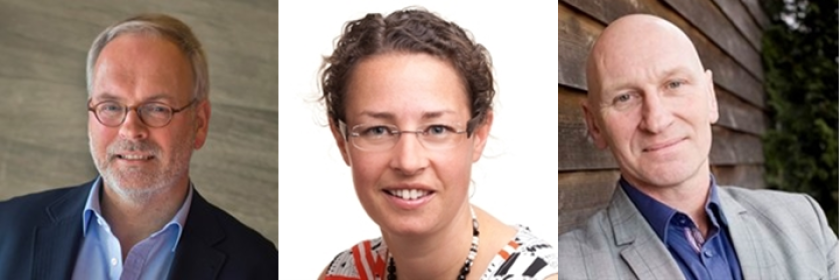
Left to right: dr. Arjen van de Giessen; dr. Joukje Siebenga; prof. Wim van der Poel
Professor Wim van der Poel is Research Leader in Emerging and Zoonotic Diseases at Wageningen Bioveterinary Research and lead on the COVRIN Project for One Health EJP. Dr. Joukje Siebenga is Programme Manager of Early Recognition and Rapid Action in Zoonotic Emergencies (ERRAZE), Animal Science Group at Wageningen University & Research. Dr. Arjen van de Giessen, is Head of Centre for Zoonoses and Environmental Microbiology at RIVM, leader of the Strategic Research Agenda of OneHealth EJP and President of the MedVetNet Association. They shared their views on the value of the EJP from a Research Institute and Ministry perspective, and the possibilities as well as the difficulties that lay ahead for a One Health approach.
Value of participation in the OHEJP and Embedding the One Health Approach
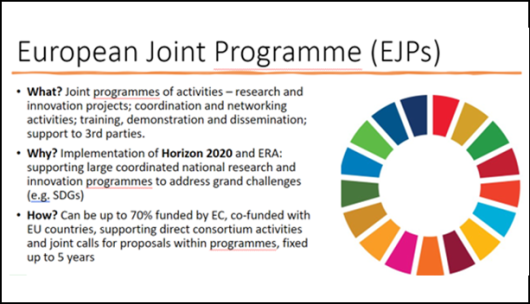
What is an EJP, why were they created and how do they work?
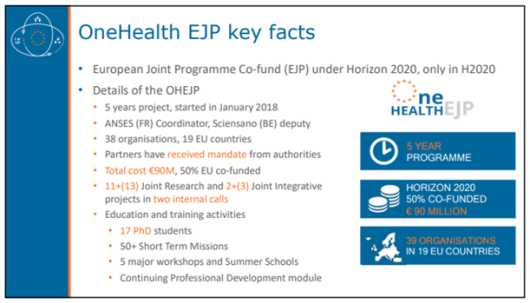
Wim noted the value of participating in the EJP in terms of both research generated and networking: “Well, for the research institute, it's important in this kind of project to have both the network aspect and the research aspect because that forces institutes or partners to do both the networking and implement the approaches at the same time. Because this is paid by the EU and its member states, it also is an incentive to use money for research and to really put effort into it. That's why it works".
Arjen explained why the EJP initiative has been relevant for the Netherlands, from the point of view of RIVM: “I think in the Netherlands, the One Health approach has already been applied for many years. It has been given a boost by the Q fever epidemic in 2007 to 2010. So there was a strong will also from our Ministry of Public Health to build upon that approach, but also to help other countries building One Health.”
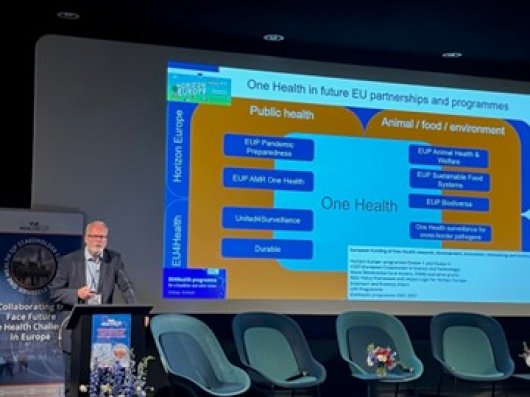
Arjen presenting at the OHEJP Stakeholder Conference, June 2023
So, for RIVM, the value of participation related to capacity building with other countries, but also working together to address emerging threats since these cross borders. We then asked whether Arjen considered the Netherlands leading in the One Health concept and its application. He explained that in some areas, yes, such as structures to handle zoonoses in terms of risk analysis and management, which is unique in Europe; for this reason, RIVM led the Cohesive project in the OHEJP, to build capacity on zoonoses structures elsewhere, conducting country studies. Wim considered Cohesive an exemplar project, a guide to how to organise institutes in partnerships for early warning on possible health threats and tackling emerging issues through research.
We asked both Wim and Joukje how much the EJP has helped to embed the One Health concept in research practice. Based on Wim's experience, some research areas have embedded One Health in research practice, but this depends on the topic or field. Joukje then mentioned the need for not only interest from researchers, but also changes in systems to ensure the concept becomes fully embedded in practice: “I think, as Wim said, the researchers are very keen to step into this One Health world and collaborate with people from other disciplines. I think the changes that need to be made are, well, the researchers need to be keen and interested and willing, but then the systems that they work in need to change with them. So, governance and structures need to take steps as well, they're always the lagging part.”
Challenges for the One Health Approach and Future Partnerships
Wim described a willingness of researchers to work together, apparent during the course of the EJP, but also questions around what a One Health approach should include: “it's quite an effort to really bring that One Health approach into the research, to really implement it, there are still discussions and questions. What should a One Health approach include for the research institute? What are the main issues or the main features of that One Health approach?”
He emphasised that the definition of One Health comprises more areas of expertise than food-borne pathogens, zoonoses and microbial resistance, explaining that he thought social and environmental aspects needed to be integrated into research in the future. Joukje pointed out that it seemed funders were taking a step backwards from a more integrated and holistic approach because human health and animal health have been separated into different European Partnerships (EPs). Wim thought funders would find it difficult to know whether to implement the One Health approach in different programmes such as AMR, or if there should be an overarching One Health theme to encompass all; both Joukje and Wim believed both were necessary in tandem to more quickly integrate the One Health concept holistically into research and practice. Joukje was concerned that “we're forgetting the bigger picture”: a similar criticism has been voiced in relation to the food systems partnership, which leaves out production, and the agroecology partnership, which focuses on production but not on societal change.
Arjen agreed with this point, and expressed hope that a wider vision of One Health would be a future aim. The European Commission has Directorate-Generals with different interests, siloed and difficult to integrate under one approach such as One Health. He highlighted the equally fundamental issue of data sharing as a key obstacle to realizing the bigger, holistic picture: “Even in the Netherlands data sharing between public health and veterinary institutes is still hampered by regulations, by privacy, of course, although we are making progress and working on solutions. But certainly, at the European level, it's quite a challenge. Now the Commission is building European structures for data sharing of public health data. But the next bridge will be to also share environmental and veterinary data. I think we need some years before we are there.”
Joukje pointed out related issues including the need to bring all data into one shared space, an integrated database, and the privatisation of lab diagnostics resulting in the scattering of results across these private labs. Other challenges raised by Joukje and Wim related to funding calls that may be too narrow and have fixed timeframes that do not allow for continuity or collaboration across fields, at the right time. Partnerships often are too short to make substantive progress within a frame of political reactivity to urgent issues of the moment; the EJPs, running for five years, were not long enough. This has also been identified as an issue in other fields such as microbiome research, which requires a food systems view and longer collaborations than allowed through funded projects.
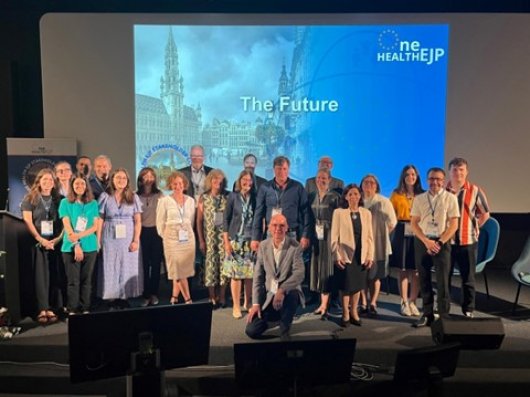
One Health EJP presenters at the end of the conference, June 2023
The new One Health Cross Agency Task Force also shows promise, to bring together previously siloed organisations such as the ECDC (European Centre for Disease Prevention and Control) and EFSA (European Food Safety Authority). Arjen, Wim and Joukje all described responsibility falling to the Med-Vet-Net Association to keep connections with different stakeholders, engaging with the new Task Force to continue the work, but as a membership organization they rely on voluntary efforts, while seeing some funding opportunities on the horizon. Arjen explained, “There is interest also from the stakeholders, especially EFSA, to collaborate with the Association. So we aim to sustain the European One Health network and play a role as an interface in between all these new partnerships”.

Many thanks to Wim, Joukje and Arjen for giving their time to interviews.
